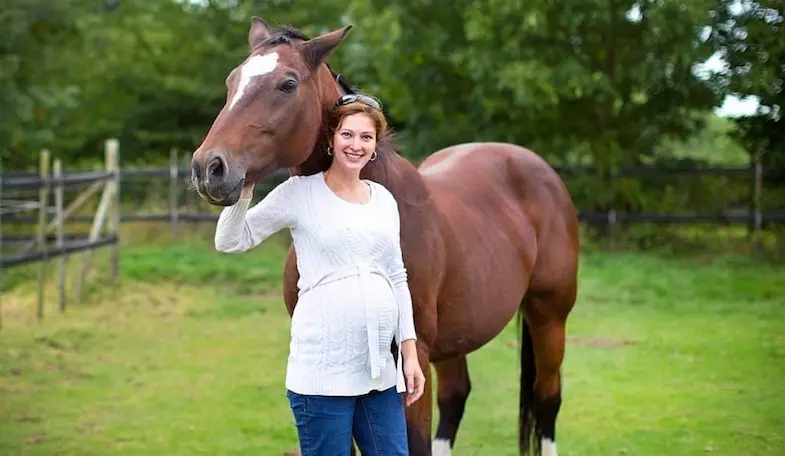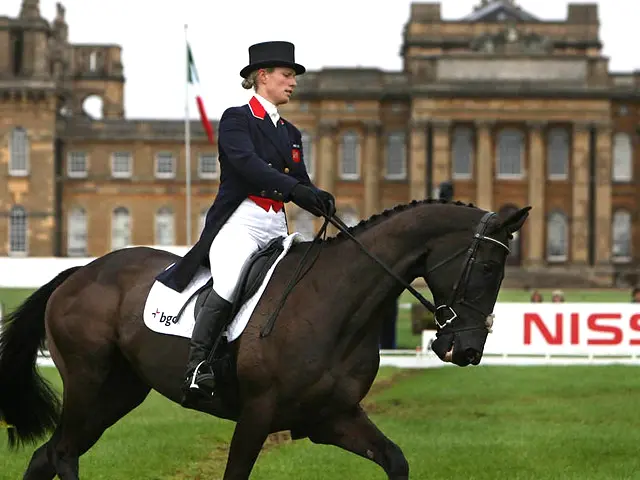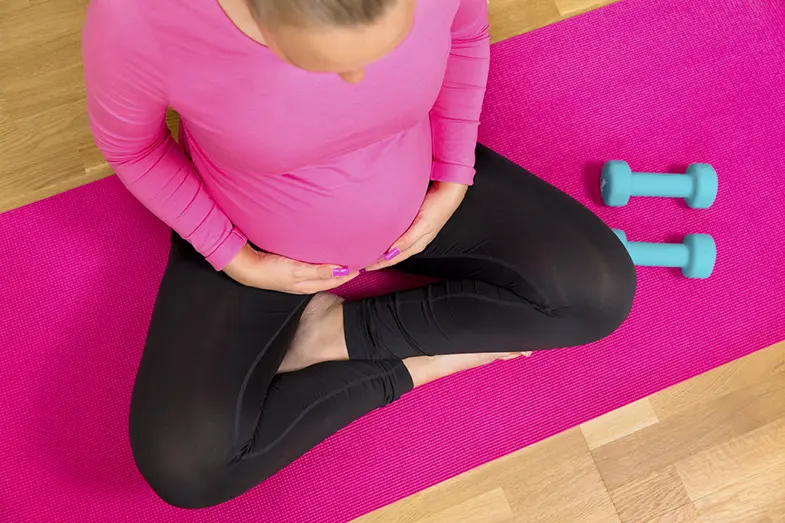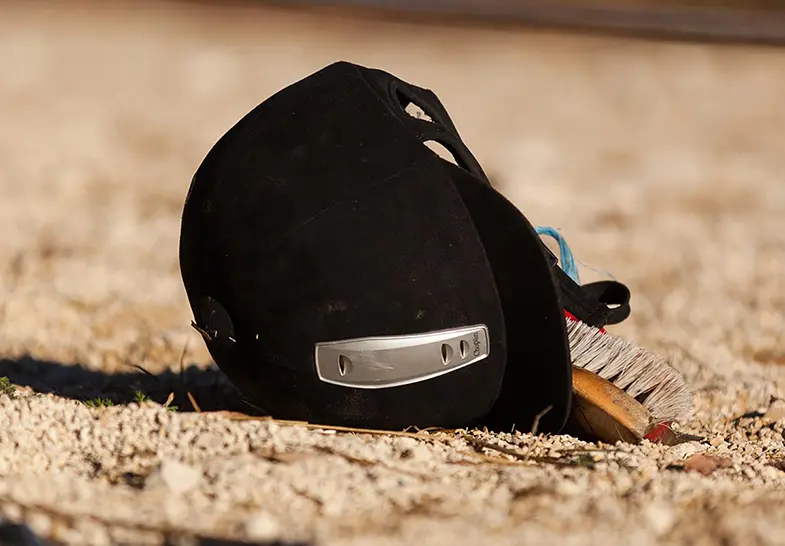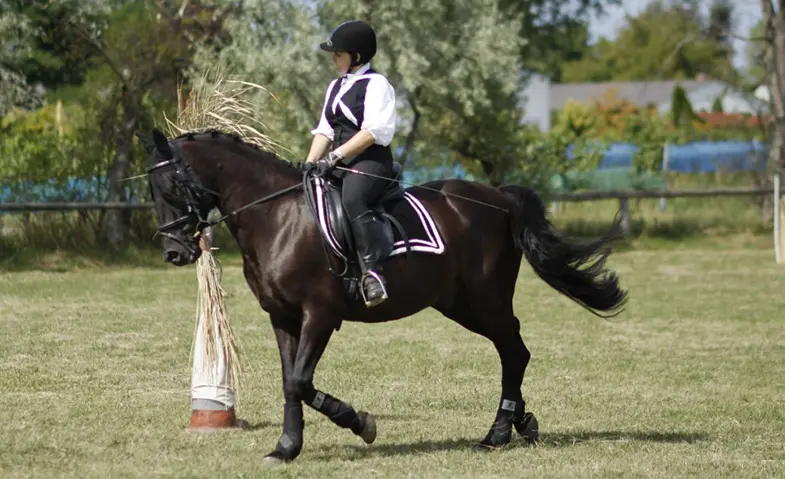Horse riding has got so many benefits and advantages that it can be hard to think why anybody would stop riding yet whether you should or shouldn’t ride while you’re pregnant is an issue that has divided people with strong arguments on either side of the fence. But with strong opinions for and against it can be very difficult to know which is right which is why I thought it would be helpful to give the facts and hopefully try and dispel some of those myths.
Is it safe to ride a horse while I’m pregnant? If you’re a fit and healthy person, have a healthy pregnancy, and are a competent horse rider then not only is it safe to continue horse riding but it can have a number of benefits such as reducing the risk of varicose veins and fluid retention and even helping you to sleep better.
Is it okay to ride a horse while pregnant?
Any google search will bring up conflicting answers to the question of whether or not you’re okay to ride while pregnant which is what makes this a contentious issue. Some people will say of course while others will say certainly not. The truth, however, lies somewhere between the two. Certainly, when you’re in the early stages of pregnancy there’s absolutely no reason at all why you can’t continue to ride. In fact, a lot of horse riding mothers-to-be (as well as non-horse riding mothers-to-be) won’t know they’re pregnant immediately so will naturally continue riding.
What are the benefits of horse riding while pregnant?
As with all other exercises, there are a great number of health benefits to horse riding, especially during pregnancy. Various studies have been carried out by a variety of different organizations on the benefits of exercising while pregnant and the general consensus is that any exercise can have both physical and mental benefits.
The benefits include a reduction in varicose veins, retention of fluid, and even tiredness. It’s also been found that exercise can also help to improve sleep and decrease stress and anxiety. While these benefits are true of all forms of exercise, horse riding also carries the additional advantages of helping to reduce back pain, keeping the body flexible, and even helping to avoid excessive weight gain. Then of course there are the mental benefits of being outdoors and spending time with animals too.
What are the risks of horse riding while pregnant?
There’s no denying the fact that horse riding is a dangerous pastime and even the best, most experienced riders, can have accidents but of course, if you’re pregnant those risks can have far more serious consequences.
Regardless of whether or not you’re pregnant the greatest risk of horse riding has to be the risk of falling or being kicked, both of which can be extremely serious. As your pregnancy develops your hormones will also change which can cause your joints to loosen, making it harder to keep your balance while in the saddle. If you feel this is the case then you should stop riding straight away.
There are also seasonal risks that are often overlooked but these can be just as serious. When the ground becomes muddy or freezes it can become very slippery which isn’t much fun at the best of times but when you’re pregnant, especially during your 2nd trimester, your body will change and your center of gravity will alter too. This can make winter barn trips even more treacherous. With this in mind, I’d advise making sure your boots have decent tread grips, or even investing in a proper pair of winter boots.
Horseback riding during the 1st trimester of pregnancy
During the first three months of your pregnancy, the fetus and the uterus are protected by the pelvis which will greatly reduce the risk of direct trauma to either the fetus or the uterus. That said though there is always a risk of falling off regardless of how experienced a rider you are and while the fetus would have some level of protection from a fall, your injuries may have an impact on the health of the fetus. If any injuries you sustained during a fall require you to have a general anesthetic then that would sadly increase the chances of a miscarriage.
As your uterus starts to stretch and enlarge you may find that it becomes uncomfortable and that you’re starting to get a lot of cramp. While this is unlikely to affect your ability to ride it can reduce your concentration levels.
Horseback riding during the 2nd trimester of pregnancy
After your first trimester, the fetus will move further up in your abdomen where the level of protection is less than it was before. This makes the act of horse riding much riskier than it was in the early stages of your pregnancy.
As you progress through your second trimester the fetus will grow considerably (weighing around 2lbs by the end of the six months), this will not only affect your center of gravity and therefore your balance but it can also affect also how comfortable you feel in the saddle as the horn or pommel will start to encroach on your baby bump.
One thing that you may not have considered though is how your balance will impact your horse. As you move towards your third trimester your muscles and joints will start to loosen up as they ready themselves for the birth. You might think that that won’t make any difference to your balance but the relaxin (the hormone that your body releases to help loosen up your muscles and joints) will relax the muscles you use to keep yourself upright in the saddle. I’m not saying that you won’t be able to sit up straight but what I am saying is that your balance will be offset and your horse will have to work harder to carry you while also constantly having to re-stabilize himself to compensate for the change in balance.
Horseback riding during the 3rd trimester of pregnancy
Most expectant moms that continued to ride during the first six months of the pregnancy find that by the time they reach their third trimester they no longer want to continue riding and when you consider the risks of injuring the baby are higher this is a sensible decision. Even if you do want to continue riding you may find that you’re not able to physically get into the saddle.
Fear not though, just because you’re not riding it doesn’t mean that you have to give up horses completely until after the birth. In fact, being around horses can have a very positive effect on your fetus, if nothing else because things like grooming will help to relax and destress you. You could also use this time to reinforce the bond you and your horse have, or you could even try a few of these fun things you can do without riding.
How to stay safe when riding while pregnant
Regardless of whether we admit it to ourselves or not there’s no denying that horse riding is a dangerous sport but when you’re pregnant there’s an added risk which is why it’s even more crucial you take all necessary precautions.
Wear a helmet
It might not be cool or fashionable to wear a riding helmet but it can help to protect your head if the worst happens and when you consider that 60% of head injuries where the rider isn’t wearing a helmet are fatal it’s a no brainer.
Also being under general anesthetic carries its own set of risks and complications and while wearing a helmet won’t completely prevent the need for surgery if you do fall it will reduce the chances of it.
Wear body protection
In the early stages of pregnancy, the baby will be protected by the pubic bone but wearing a body protector will help to give you extra protection, although you shouldn’t wear one if it’s putting pressure on your uterus.
When you’re no longer able to wear a body protector you should use an air jacket instead. While it won’t protect you in the same way that a body protector will it does offer a certain amount of cushioning which can help to protect your baby a little.
Choose your horse wisely
When people ask if they’re okay riding while pregnant they often overlook the effect the horse can have on their ability to ride. Ideally, you should only really be riding gentle well-balanced horses, those that are more flighty or spooky will only increase the risk of injury.
If you’re not sure of a horse’s nature or how they’ll react in a given situation then is it really worth the risk?
If you’re not happy don’t ride
If you’ve got any doubts about whether or not you should be riding then I’d strongly advise you don’t. While, in most cases, it’s good to confront your fears, when you’re pregnant it’s another matter. There’s a reason why you’re feeling nervous or anxious so it’s better to not take any chances.
When should you stop horse riding while pregnant?
Most people will agree that while it’s down to personal choice whether or not you continue riding, for those that do continue the question then becomes when should I stop riding. Some people may feel that they should stop when they reach the 2nd trimester while other riders may decide to continue until a few weeks before they give birth.
Everybody is different and therefore it’s not realistic to say you should stop riding at X number of months. Instead, it’s far better to listen to the signs your body is giving you and use those to gauge when you should stop.
As your pregnancy develops your body will change and you may find that you’re no longer able to get into the saddle or, if you can, that you just don’t feel comfortable being there. If you don’t experience any unpleasant effects from riding and are happy to continue then great, but if you do then you should stop straight away and speak to an obstetrician before continuing. After all, you’re responsible for another life as well as your own.
Any unusual symptoms should be investigated when you’re pregnant but if you experience any of the following then you should stop riding (as well as other exercises) immediately, regardless of how far gone you are.
- Increased shortness of breath
- Chest pain or palpitations
- Fainting or feeling dizzy
- Preterm labor
- Leaking of amniotic fluid
- Vaginal bleeding
- Excessive fatigue
- Abdominal pain
- Pelvic girdle pain
- Reduction of fetal movement
- Difficulty breathing before exercise
- Headache
- Muscle weakness
- Calf pain or swelling
Does horse riding while pregnant increase the risk of miscarrying?
Many women worry that horse riding while pregnant will increase their risk of miscarrying, but there is no evidence at all to suggest horse riding during your first trimester will increase the risk of miscarriage if you don’t have a history of miscarrying. That is, of course, to some extent dependent on the type of riding you do and whether or not you fall off. Now I know that nobody wants to fall off and that it’s human nature to think that it won’t happen to you but a fall can happen to even the most experienced riders.
For argument’s sake let’s say that you’re only going to be doing light work with no jumping, racing, or anything too bouncy and that you’re not going to fall off. In this case, and if you have a healthy pregnancy, then there’s no extra risk at all from horse riding.
As you progress through your pregnancy and the fetus moves up your abdomen and further away from the protection of your pelvis this risk is increased. Along with the risk of miscarriage you also need to be careful to avoid placental abruption (A serious complication where the placenta prematurely breaks away from the wall of the uterus) which can be brought about by bouncing around in the saddle.
Getting back in the saddle after a baby
It can be tempting to think that as soon as you’ve given birth you’ll start riding again but it’s important that you don’t rush into it too quickly. Your body will have gone through a lot of changes that it will take time to recover from.
I know I’ve said it before but it’s important to listen to your body, it knows when you’re ready to do things and when you’re not ready. Even if you rode during most of your pregnancy it will still have been a while since you last rode so don’t expect to be able to jump back in the saddle and begin where you left off.
The most important thing of all is don’t put any pressure on yourself, you’ll know when you’re ready.
Disclaimer
This article is solely for information purposes and is not meant to be a full medical consultation, nor should it be a substitute for one. If you’re in any doubt as to whether you should ride or not your obstetrician will be able to advise you medically. This article is just a guide but I hope it helps.
Related questions
Can horse riding affect my chances of conceiving?
Years ago a friend asked me if horse riding would prevent her from conceiving and while I was surprised to be asked (I normally get asked if people can ride during pregnancy) I was happy to tell her that there’s absolutely no chance of horse riding reducing your chances of conceiving. When you’re trying to conceive there is no difference between horse riding, walking, running or cycling, or most other activities for that matter.
Should I take up horse riding during my pregnancy?
While most doctors say it’s important to keep active and exercise during a pregnancy that doesn’t mean you should go ahead and take up a high-risk pastime such as horse riding if you’ve never been riding before. The reason for this is that horse riding requires a lot of balance to keep yourself in the saddle, if you don’t already have this balance then you’ll find yourself bouncing around a lot and therefore increasing the risk to your unborn baby.
I hope you found this article helpful. If you did I’d be grateful if you could share it please as it would really help me.
Recommended products
Over the years I have tried hundreds of different horsey products, from various blankets and halters to different treats. Some I’ve loved, others I’ve hated but I thought I’d share with you my top all-time favorite products, the ones I never leave the yard without. I’ve included links to the products (which are in no particular order) that I really think are great.
- Horse Knots by Reference Ready – If you’re like me and enjoy pocket reference guides then you’ll love this knot tying guide. These handy cards can easily fit in your pocket or attach to the saddle for quick reference. They’re waterproof, durable and are color coded to make them easy to follow.
- Mane ’n Tail Detangler – Even if you never show your horse you’ll need to detangle his tail from time to time (and possibly his mane too) which is always a challenging chore! I’ve found that if I run a little bit of detangler through my horse’s tails every few days it stops them from getting matted up and makes combing them easy, even if they’re coated in mud. I don’t know if I should admit to this or not but it also works wonders on my hair.
- TAKEKIT Pro clippers – Over the years I’ve tried a lot of different clippers and while some were obviously better than others I found these to be by far the best. They are heavier than a lot of other clippers but for me, that’s a good thing, it makes them feel more sturdy and hardwearing. On top of that they have a range of speeds so are just as good for clipping your horse’s back as they are his face. I also like the fact that they come in a handy carry case but that’s not for everybody. The company that makes them is super good and incredibly helpful too, a real bonus these days. The only thing I wasn’t keen on was the fact that it doesn’t come with any oil, but that’s not a major problem as it’s not difficult to buy lubricant.
- Shire’s ball feeder – There are so many boredom buster toys out there but I like to use these every day, regardless of whether or not my horses are bored. I find that it helps to encourage my horses to problem solve by rewarding them with treats (or pieces of fruit) but it also mimics their natural grazing behavior which helps to keep them calm and de-stressed.
- Horse safe mirror – This is a strange one that many people are surprised about but I like to put horse safe mirrors in the trailers as well as in the quarantine stalls. It helps to prevent the feeling of isolation by giving the impression of other horses being around. Being herd animals horses can get extremely stressed when they feel that they’re on their own but with these stick-on mirrors, they believe that at least one other horse is with them.
- Rectal thermometer – I know this isn’t glamourous at all but it’s vital for your horse’s well-being to be able to check their temperature and a rectal thermometer is the easiest way of doing this which is why I’ve added it to the list.
Shopping lists
I’ve also put together a few shopping lists of essential items that I’ve found helpful over the years. I’ve broken the lists down into different categories rather than put everything in one massive list 😉

